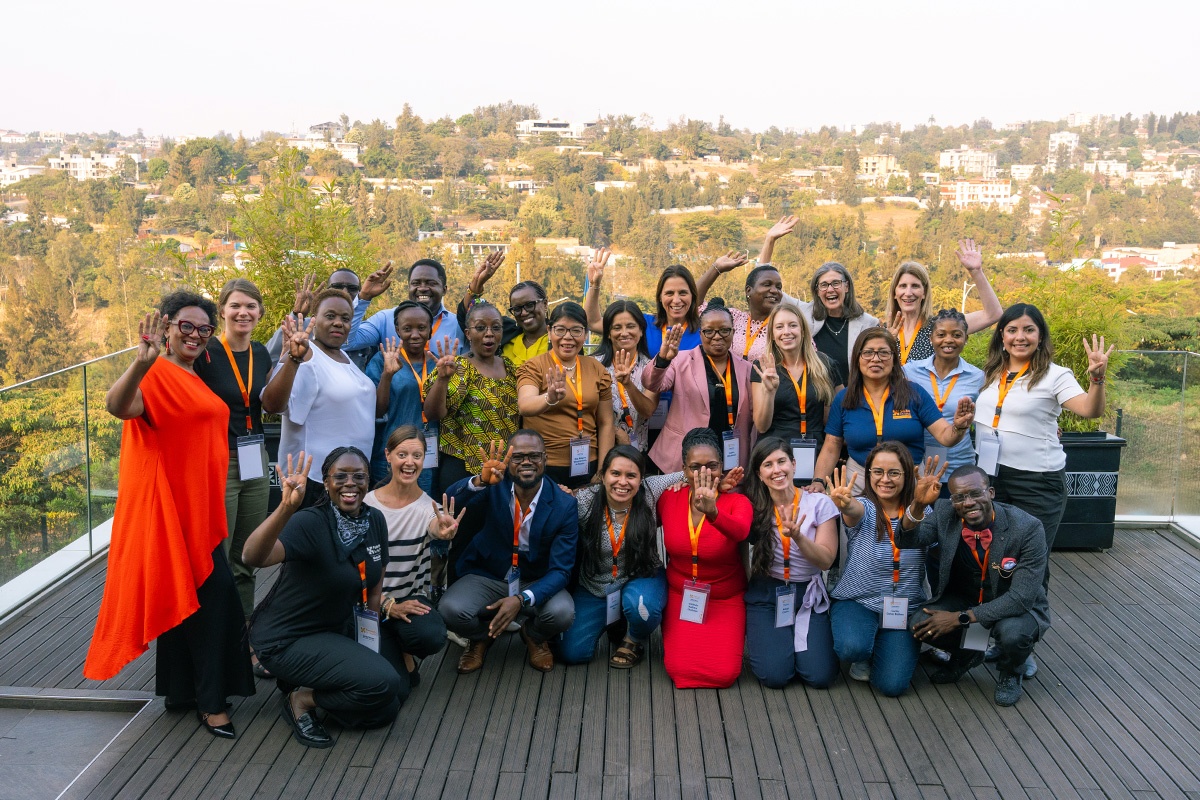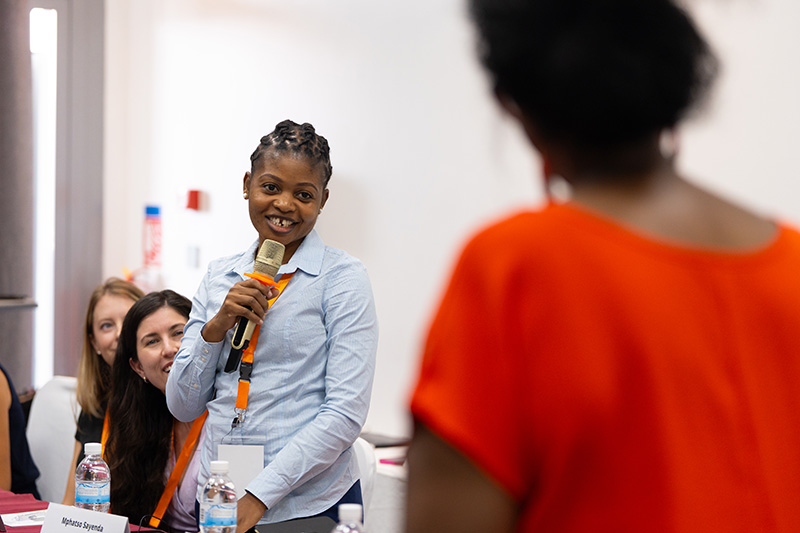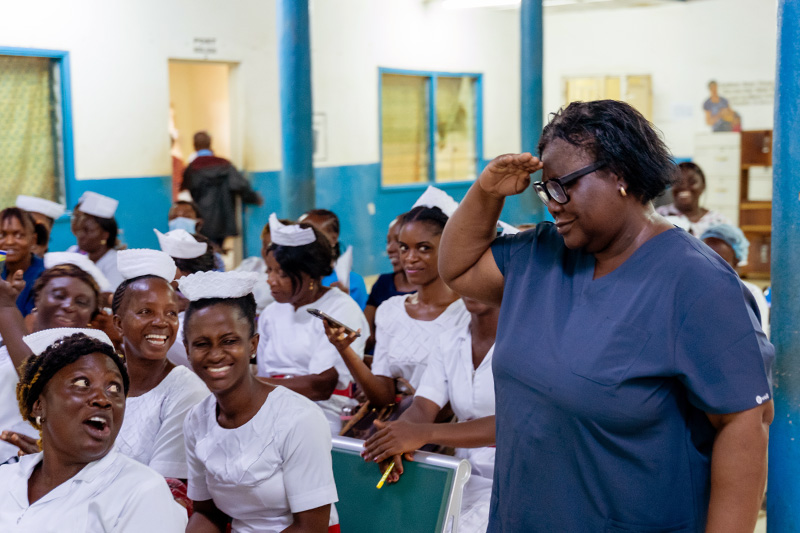PIH Celebrates Nurse and Midwife Fellowship Graduation
Partners In Health is celebrating the graduation of 14 fellows from the Global Nurse Executive Fellowship —and the impact their leadership has already made.
Posted on Jun 26, 2025

In a matter of months, a nurse, in collaboration with other health care workers at Partners In Health (PIH)-supported Rwinkwavu District Hospital in Rwanda, increased the percentage of child patients screened for malnutrition from 52 percent to 96 percent.
During the same time—in another part of the continent—a nurse at the Neno District Hospital in Malawi implemented a project that more than tripled the amount of monthly cervical cancer screenings performed on women.
And thousands of miles away in Haiti, the percentage of nurse aids at the Hôpital Universitaire de Mirebalais who could confidently perform breast cancer self-examinations climbed from 20 percent to nearly 90 percent.
When nurses are empowered to be leaders in their clinics and communities, lives change.
Launched in 2017, the PIH Global Nurse Executive Fellowship (GNEF) facilitates the development of culturally humble and confident nursing and midwifery leaders. Participants address current and emerging health issues and work to transform health systems while growing their executive presence alongside their communication, financial management, and team-building skills.
Nurses and midwives are often the first people patients interact with in hospitals. They are acutely attuned to the challenges of patient care delivery—and are key in implementing the solutions. This fellowship aims to empower these health care professionals to tackle problems and invest in them as leaders.
Self, others, and systems
Fourteen nurses and midwives across the OnePIH network joined the fourth cohort of the fellowship. The nine-month program includes mentorship, training, coaching, and professional development. There are also three weeklong intensive sessions, each focused on a different area of leadership: self, others, and systems.
The “leading self” piece involves creating a personal nursing vision, building executive presence and communication skills, and creating a capstone project proposal—like determining how to increase the number of children screened for malnutrition or nurses who can perform breast cancer self-examinations. This year, fellows gathered in Kigali, Rwanda’s capital city, for a 10-day intensive on this part of the fellowship.
In the second phase, participants focus on leading others. Fellows learn about financial management, supply chains, and budgeting. Patient safety, improved service delivery, evidence-based care, team building, and mentoring are also central themes of the curriculum. In this phase, the capstone project implementation begins.
The final phase is the “leading systems” section. It focuses on applying knowledge and understanding the role of professional advocacy, grant writing, and financial management. Fellows also refine their personal visions, develop abstracts and posters, and analyze and deliver their capstone projects.
"The GNEF represents a one-of-a-kind opportunity for rising nurse leaders in clinical sites across the OnePIH network to identify their own unique leadership styles and enhance their executive leadership skills while simultaneously showcasing their abilities to design, implement, and evaluate significant quality improvement initiatives within their work environments,” said Katie Buhikire, GNEF program manager.

The fellows, who are from 8 different country sites around the world, grew their leadership skills and made tangible changes in their communities—from testing all pregnant women for asymptomatic bacteriuria infections, which can cause premature labor, to digitizing vaccine stock management in Lesotho, which increased the number of children under the age of 5 who received immunizations.
“The fellowship is a transformative journey beyond professional development—it serves as a platform for building leadership, driving innovation, and making a tangible impact in health systems,” said Patricia Efe Azikiwe, one of the Cohort 4 fellows. “I want people to understand that this fellowship is not just about acquiring new knowledge, but about applying that knowledge to real-world challenges. It equips fellows with the tools necessary to lead change, inspire others, and enhance the quality of care in their communities.”
Azikiwe’s GNEF capstone project revolved around implementing the World Health Organization’s Safe Childbirth Checklist at the Koidu Government Hospital in Sierra Leone. In Sierra Leone, 1 in 74 women face a lifetime risk of dying in childbirth. In comparison, the rate is approximately 1 in 4,000 in the United States and 1 in 60,000 in Norway. The scale of this injustice is almost hard to imagine.
While continued investment and ambitious policies have driven down the rate by over 70 percent in two decades—a faster decline than any other county in the world, in almost any 20-year-period in modern history—there is still significant work to be done.
“My thought process began with a simple yet powerful question: How can we ensure every woman receives essential, evidence-based care during childbirth and psychosocial support, every time?” Azikiwe said.

After implementing the checklist through the GNEF program, birth asphyxia rates dropped from 37 percent to 15 percent and postpartum hemorrhage from 32 percent to 20 percent. Patricia also added a depression screening to the checklist, leading to the identification of mental health cases in 3 percent of patients.
Another fellow, Jules Cesar Munyabugingo, implemented an audit for maternal and neonatal near-miss cases, or MNNs, at the Kirehe District Hospital in Rwanda. These are instances where a mother or baby nearly dies from a serious complication but ultimately survives. After implementation, the surgical site infection rate decreased from 2.6 to 1.2 percent the birth asphyxia rate dropped from 1 to 0.6 percent, and there was only one case of uterine rupture in the last two months.
“As a GNEF graduate, I feel both rewarded and empowered, furthermore, knowing that all the efforts I invested have paid off,” Munyabugingo said. “The exposure and learning I gained throughout the program have significantly strengthened my confidence to lead with purpose and by example. I now feel more equipped and capable to lead myself, leading the systems, and leading others.”
And Mphatso Sayenda, whose project centered around increasing the testing of pregnant women for asymptomatic bacteriuria infections, said she is encouraged to know the Lisungwi Community Hospital in Malawi will continue to implement this practice even after the conclusion of her project.
With their new skills, fellowship graduates have gone on to become leaders at Partners In Health, including Vicky Reed, a Cohort 2 member who is now the executive director of PIH-Sierra Leone.
Cohort 4 was also the first time the program expanded to include four Spanish-speaking fellows from Mexico and Peru. The curricula were translated and administered in Spanish and the fellows were paired with Spanish-speaking coaches. PIH also provided translators for mixed-language settings.
“As Program Manager of this innovative fellowship, it has been a privilege to guide Cohort 4 throughout their leadership journey, and we are looking forward to building upon the experiences of this group to continue improving delivery of the program to the next round of distinguished fellows,” Buhikire said.

